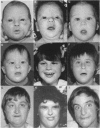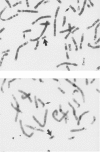Abstract
Nine cases are described of tetrasomy 18p resulting from the presence of an isochromosome 18p [i(18p)]. The initial diagnosis of i(18p) was by standard cytogenetic techniques and was confirmed by in situ hybridization with a biotinylated alphoid probe (L1.84) specific for the pericentric region of chromosome 18 and with a tritium-labeled chromosome 18 probe (B74) which hybridizes to the D18S3 locus situated at 18p11.3. The clinical features of the cases are summarized and shown to constitute a distinct and recognizable syndrome. Common features were low birth weight, a characteristic facies, neonatal hypotonia with subsequent limb spasticity, short stature, microcephaly, mental retardation, and seizure disorders. On the basis of size and cytogenetic banding a marker chromosome can be suspected to be an i(18p). In situ hybridization with the alphoid probe L1.84 provides confirmation of chromosome 18 origin. This more precise diagnosis will be an advantage in situations of pre- and postnatal diagnosis, since parents can be provided with a more confident prognosis for their child.
Full text
PDF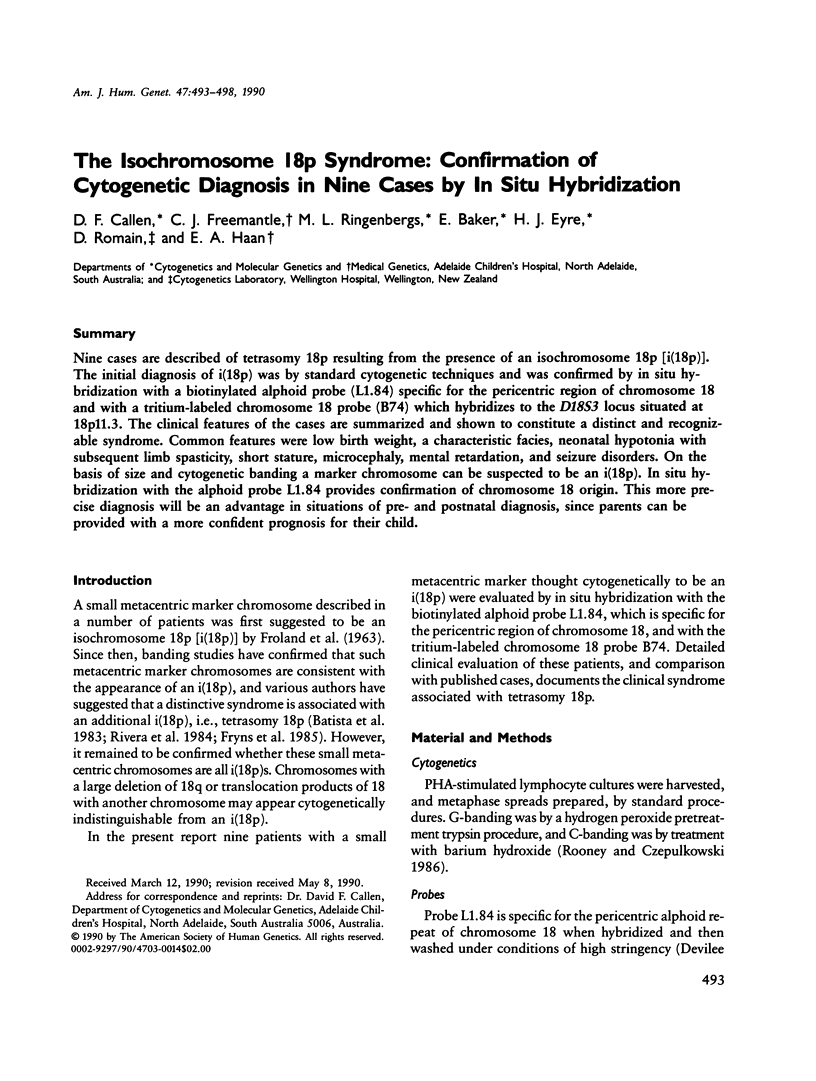
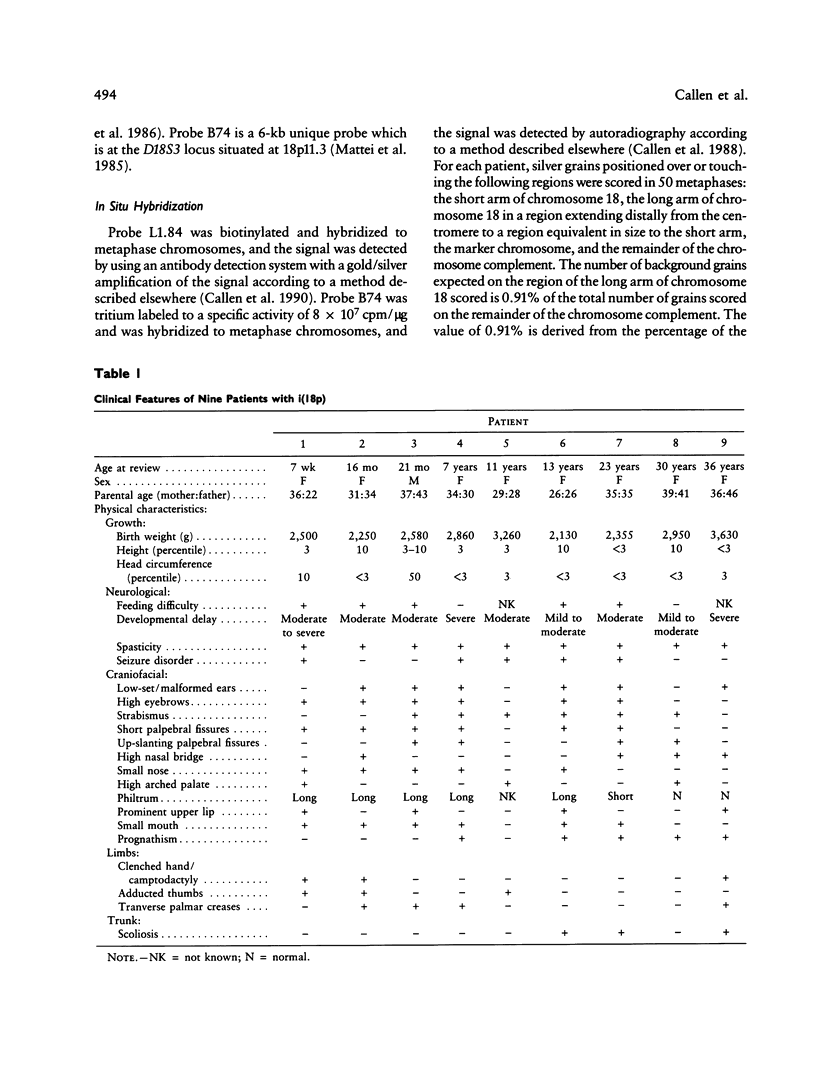
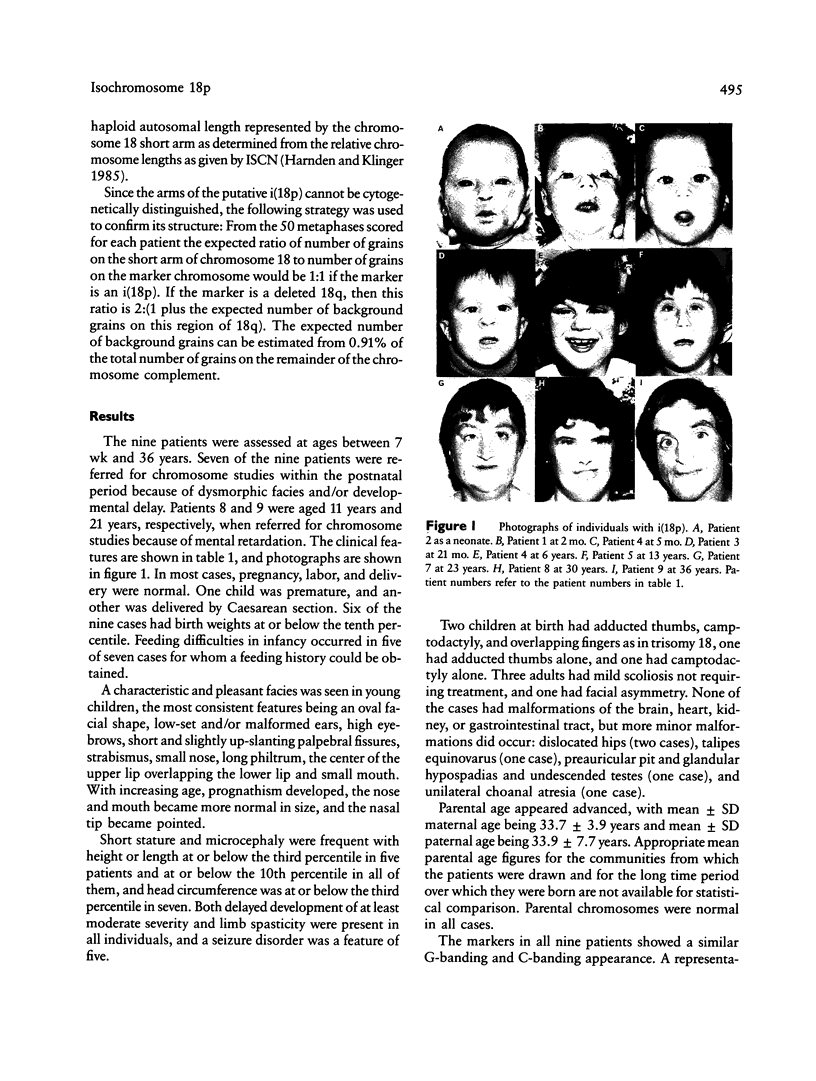
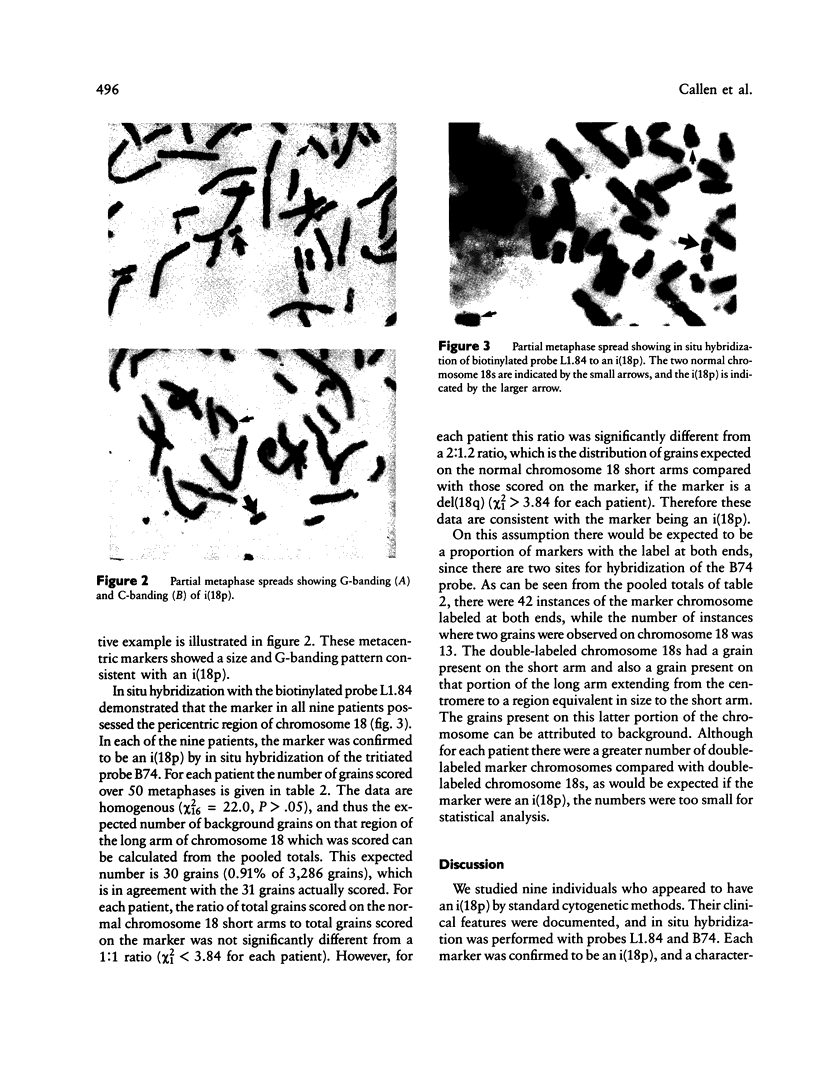
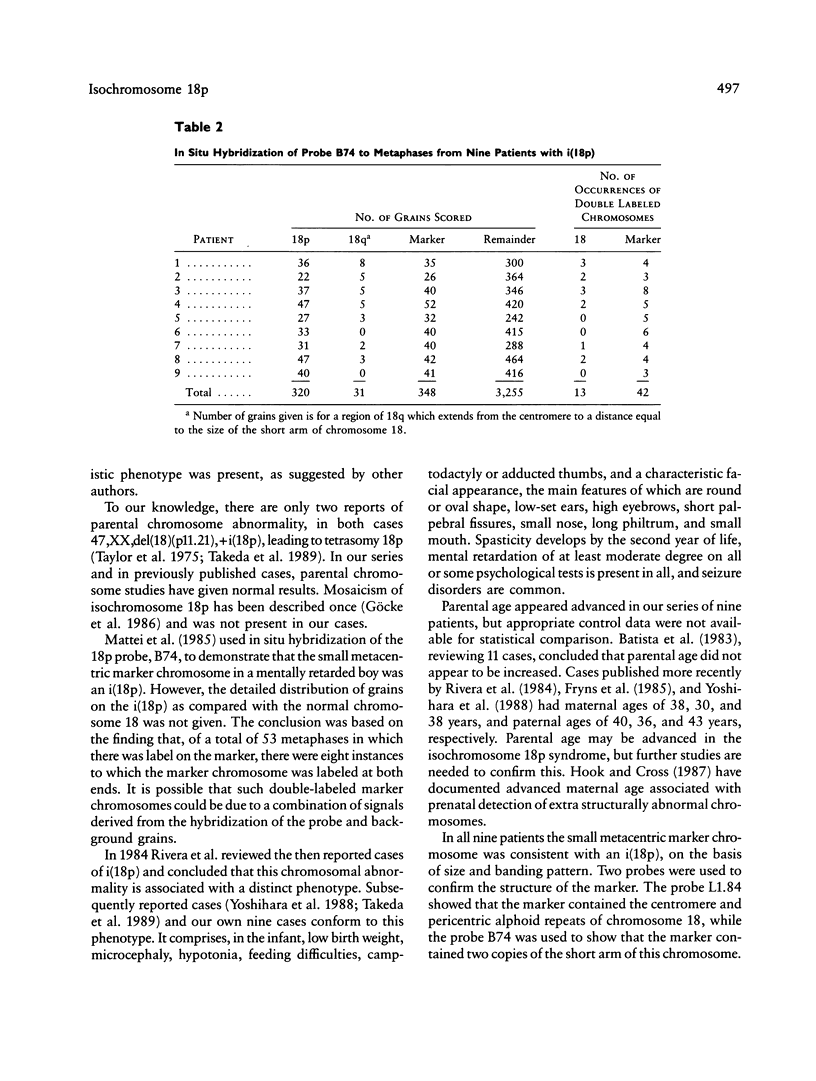
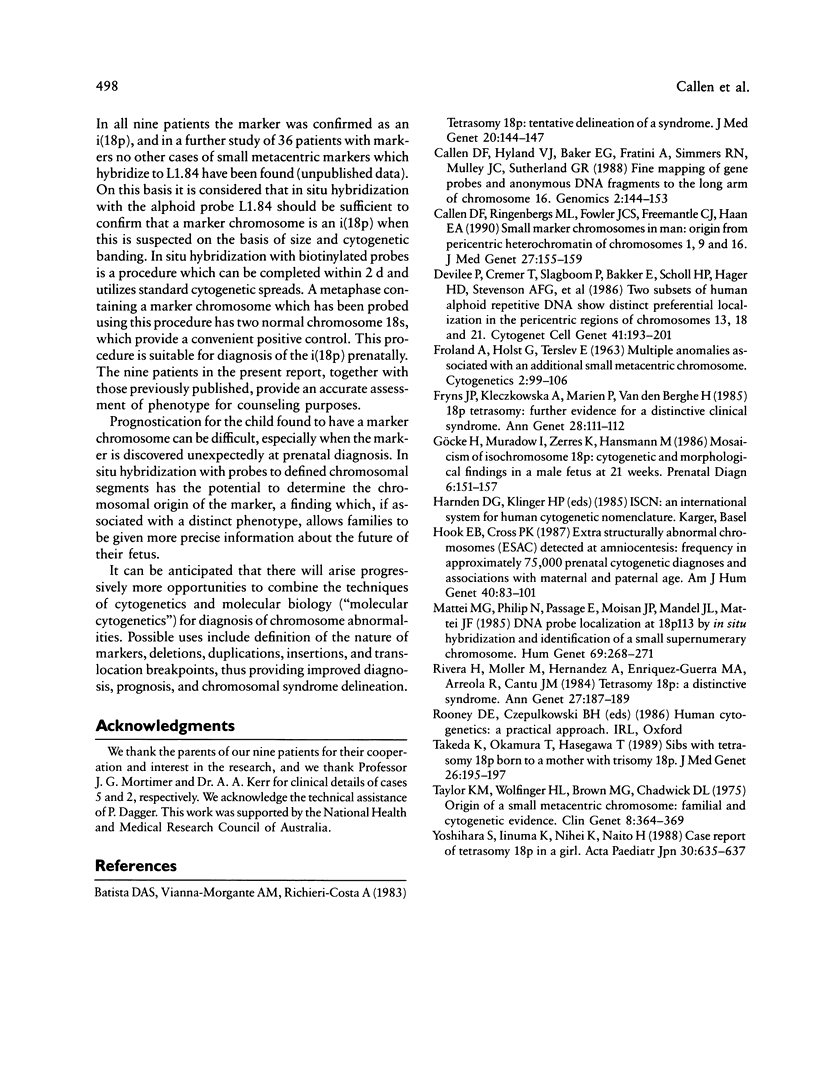
Images in this article
Selected References
These references are in PubMed. This may not be the complete list of references from this article.
- Batista D. A., Vianna-Morgante A. M., Richieri-Costa A. Tetrasomy 18p: tentative delineation of a syndrome. J Med Genet. 1983 Apr;20(2):144–147. doi: 10.1136/jmg.20.2.144. [DOI] [PMC free article] [PubMed] [Google Scholar]
- Callen D. F., Hyland V. J., Baker E. G., Fratini A., Simmers R. N., Mulley J. C., Sutherland G. R. Fine mapping of gene probes and anonymous DNA fragments to the long arm of chromosome 16. Genomics. 1988 Feb;2(2):144–153. doi: 10.1016/0888-7543(88)90096-1. [DOI] [PubMed] [Google Scholar]
- Callen D. F., Ringenbergs M. L., Fowler J. C., Freemantle C. J., Haan E. A. Small marker chromosomes in man: origin from pericentric heterochromatin of chromosomes 1, 9, and 16. J Med Genet. 1990 Mar;27(3):155–159. doi: 10.1136/jmg.27.3.155. [DOI] [PMC free article] [PubMed] [Google Scholar]
- Devilee P., Cremer T., Slagboom P., Bakker E., Scholl H. P., Hager H. D., Stevenson A. F., Cornelisse C. J., Pearson P. L. Two subsets of human alphoid repetitive DNA show distinct preferential localization in the pericentric regions of chromosomes 13, 18, and 21. Cytogenet Cell Genet. 1986;41(4):193–201. doi: 10.1159/000132229. [DOI] [PubMed] [Google Scholar]
- FROLAND A., HOLST G., TERSLEV E. MULTIPLE ANOMALIES ASSOCIATED WITH AN EXTRA SMALL AUTOSOME. Cytogenetics. 1963;2:99–106. doi: 10.1159/000129771. [DOI] [PubMed] [Google Scholar]
- Fryns J. P., Kleczkowska A., Marien P., Van den Berghe H. 18p tetrasomy. Further evidence for a distinctive clinical syndrome. Ann Genet. 1985;28(2):111–112. [PubMed] [Google Scholar]
- Göcke H., Muradow I., Zerres K., Hansmann M. Mosaicism of isochromosome 18p. Cytogenetic and morphological findings in a male fetus at 21 weeks. Prenat Diagn. 1986 Mar-Apr;6(2):151–157. doi: 10.1002/pd.1970060211. [DOI] [PubMed] [Google Scholar]
- Hook E. B., Cross P. K. Extra structurally abnormal chromosomes (ESAC) detected at amniocentesis: frequency in approximately 75,000 prenatal cytogenetic diagnoses and associations with maternal and paternal age. Am J Hum Genet. 1987 Feb;40(2):83–101. [PMC free article] [PubMed] [Google Scholar]
- Mattei M. G., Philip N., Passage E., Moisan J. P., Mandel J. L., Mattei J. F. DNA probe localization at 18p113 band by in situ hybridization and identification of a small supernumerary chromosome. Hum Genet. 1985;69(3):268–271. doi: 10.1007/BF00293038. [DOI] [PubMed] [Google Scholar]
- Rivera H., Möller M., Hernández A., Enríquez-Guerra M. A., Arreola R., Cantú J. M. Tetrasomy 18p: a distinctive syndrome. Ann Genet. 1984;27(3):187–189. [PubMed] [Google Scholar]
- Takeda K., Okamura T., Hasegawa T. Sibs with tetrasomy 18p born to a mother with trisomy 18p. J Med Genet. 1989 Mar;26(3):195–197. doi: 10.1136/jmg.26.3.195. [DOI] [PMC free article] [PubMed] [Google Scholar]
- Taylor K. M., Wolfinger H. L., Brown M. G., Chadwick D. L. Origin of a small metacentric chromosome: familial and cytogenic evidence. Clin Genet. 1975 Nov;8(5):364–369. doi: 10.1111/j.1399-0004.1975.tb01515.x. [DOI] [PubMed] [Google Scholar]
- Yoshihara S., Iinuma K., Nihei K., Naito H. Case report of tetrasomy 18p in a girl. Acta Paediatr Jpn. 1988 Oct;30(5):635–637. doi: 10.1111/j.1442-200x.1988.tb01592.x. [DOI] [PubMed] [Google Scholar]



